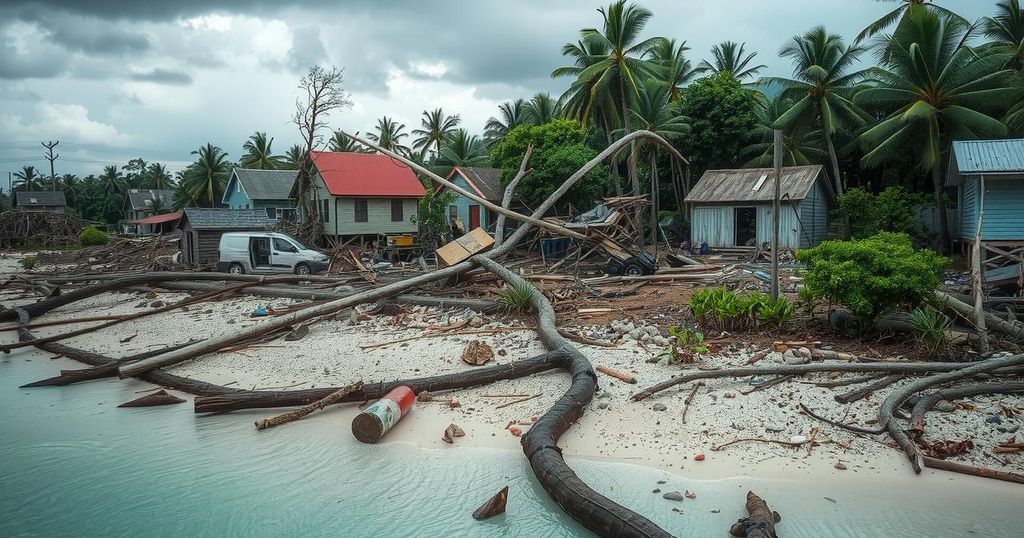Cyclone Chido has devastated Mayotte, resulting in widespread destruction and a potential death toll ranging from hundreds to thousands. Residents face extreme shortages of food, water, and shelter, with rescue operations hindered by infrastructural damage and the challenges posed by undocumented migrants. French authorities have mobilized aid, but the situation remains dire as the territory copes with unprecedented aftermath of the storm.
In the aftermath of Cyclone Chido, devastating scenes reminiscent of a nuclear disaster have emerged from Mayotte, as residents grapple with the destruction wrought by the most powerful storm to hit the French territory in nearly a century. Winds exceeding 225 km/h (140 mph) leveled numerous settlements, primarily affecting impoverished communities living in makeshift housing. Up to 20 fatalities have been confirmed; however, local officials warn that the actual death toll could escalate into the hundreds or even thousands as rescue operations progress amid significant infrastructure damage, including downed power lines and impassable roadways.
Rescue teams from France are actively searching for survivors, but the presence of over 100,000 undocumented migrants among the territory’s 320,000 inhabitants complicates efforts to accurately assess the number of casualties. Essential supplies have begun to arrive, although regions remain critically short on food, water, and shelter.
Access to clean drinking water is severely compromised. One healthcare worker reported that the available water was “completely yellow” and undrinkable, reflecting the dire conditions. Healthcare facilities have experienced significant degradation, leaving many residents feeling abandoned without knowledge of forthcoming aid.
The historical context of Mayotte, a French overseas territory since 1841, is marked by poverty, unemployment, and social instability, with about 75% of the population living below the national poverty line. The cyclone has disproportionately impacted vulnerable groups who are often undocumented, making the task of documenting losses and rendering aid even more difficult. Resistance to migration remains prevalent as many families seek to claim asylum within this territory while struggling in the aftermath of the storm.
As the situation evolves, French officials, including the Interior Minister and Health Minister, continue to assess damage, orchestrate relief efforts, and highlight the extensive needs of the population. The impact of climate change on storm intensity has also been noted, with experts indicating that while storms may not occur more frequently, their severity is likely to increase.
Although some regions are beginning to receive tap water, the overall humanitarian situation remains precarious, underscoring the urgent need for coordinated rescue operations and long-term recovery efforts as Mayotte faces an unprecedented crisis.
Cyclone Chido has caused catastrophic devastation in Mayotte, a French overseas territory in the Indian Ocean. In a region already challenged by poverty and high unemployment, the cyclone’s destructive power has severely impacted the local population, most of whom live in informal settlements. Recovery efforts are complicated by infrastructural damage and the presence of undocumented migrants, who are often invisible in official counts. The French government has mobilized resources and personnel to address the unfolding humanitarian crisis.
In conclusion, Cyclone Chido has wrought profound destruction in Mayotte, with the potential for a high death toll emerging as communities await critical relief. The ongoing humanitarian crisis reflects longstanding issues of poverty and vulnerability in the region, necessitating an urgent and comprehensive response from both local and international entities. Effective coordination and assistance are crucial to alleviate the suffering of affected residents while addressing structural inequalities inherent in the territory.
Original Source: www.bbc.com






